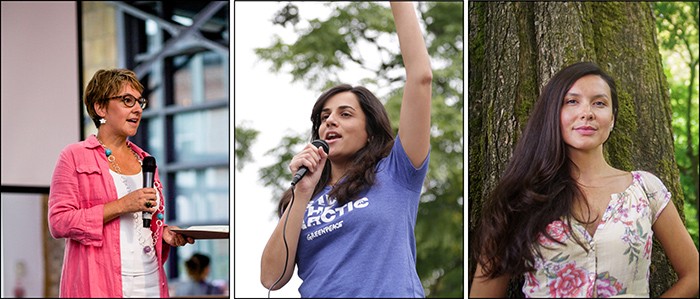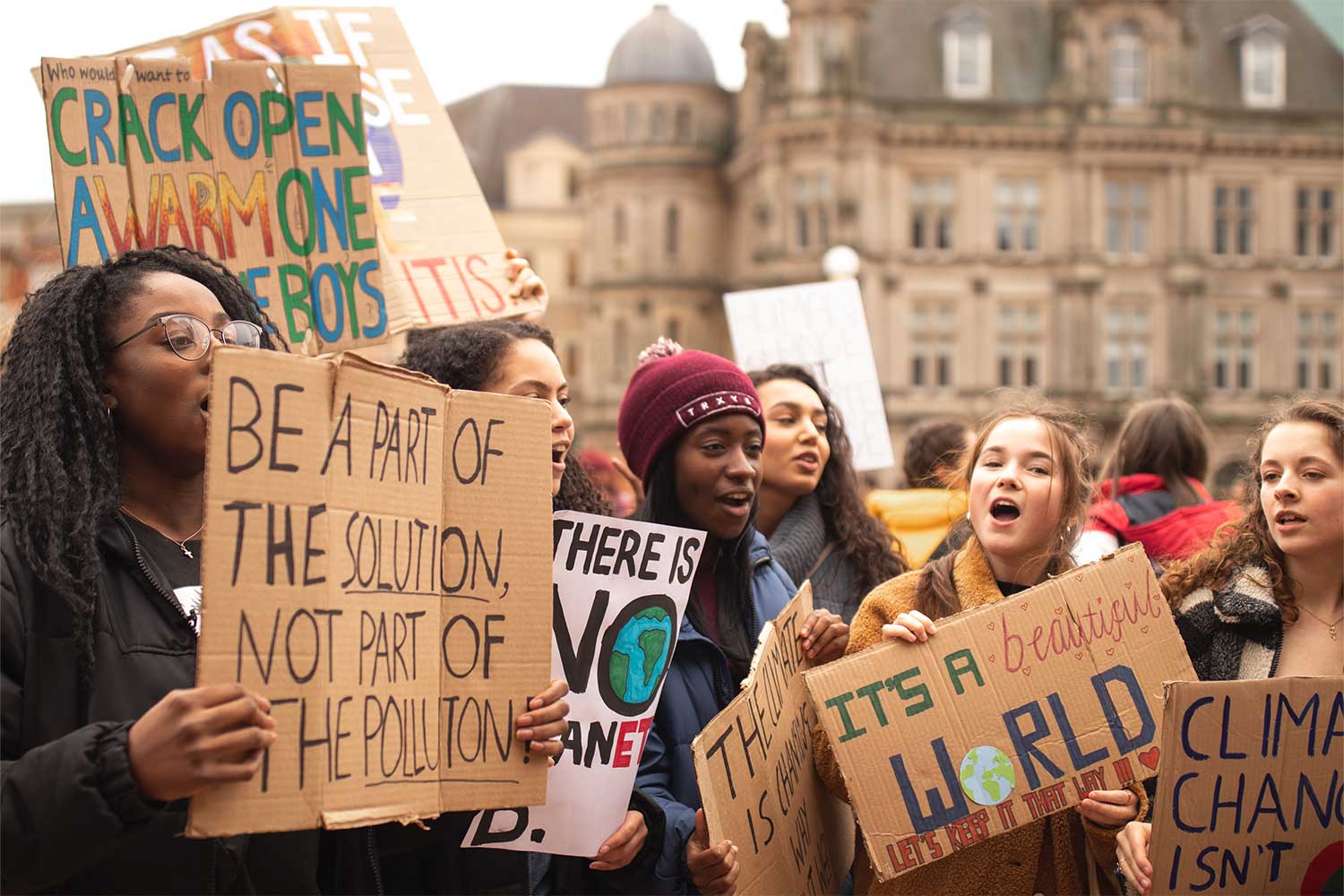A Feminist Climate Renaissance for the Roaring 2020s
Women are shaking up the climate movement with fierce, compassionate leadership.
As we wade into the 2020s amid a pandemic and deepening climate emergency, I find myself bombarded by the message that saving the world is women’s work. I see it in the underpaid women care-workers holding society together. I scroll past it in Instagram ads encouraging me to buy sustainable products. I even celebrate its embodiment by teen girls leading climate strikes.
Yet, women are still being boxed out of formal leadership roles. At global climate talks, for example, women make up fewer than 30% of country delegation leaders. And research shows women in the US conservation movement grapple with hiring and promotion bias, among other manifestations of workplace sexism. Racialized women may find ourselves labelled “the ‘problem’ woman of colour” in our workplaces. It’s a term some anti-racist educators use to describe the retaliation we may face when pointing out injustice.
The feminist climate renaissance is rooted in compassion, connection, creativity, and collaboration.
Women’s response to all of the above? Remake the movement from the roots up.
“There is a renaissance blooming in the climate movement,” write marine biologist Dr. Ayana Elizabeth Johnson and author Dr. Katharine Wilkinson in All We Can Save, their anthology spotlighting women climate leaders. A “feminist climate renaissance,” to be precise, “rooted in compassion, connection, creativity, and collaboration.” It’s focused on joyfully uplifting one another, making space to discuss emotion, and healing systemic inequities.
I feel like I’m on the threshold of this feminist flowering, more empowered to stand against injustice, but still unlearning years of oppressive work habits, and struggling at times to feel worthy in the movement. Recently, I reconnected with three women who have offered me care, patience, and wisdom in my journey, and I want to share their reflections here.
Farrah Khan is my colleague at Greenpeace Canada, leading organizational strategy, diversity and decolonization efforts as our deputy director. Farrah’s journey begins with her Desi (Punjabi) and Muslim roots.
“Thinking about my grandmothers and my mother, they definitely called the shots,” she tells me over Zoom. Caring, opinionated women held her community in suburban Toronto together, but were often denied the same opportunities as men. “While I saw their strength in leadership, I also didn’t have mentorship when it came to building my own career,” she adds. “In some ways I think I winged it. In others I think I still drew from their strength and applied it in the best way I knew how.”
Gender diversity gains at green groups overwhelmingly benefit white women.
Having joined the environmental movement in 2006, Farrah remembers times she was the only woman and person of colour at the table with heads of big green groups. Things are changing, but not fast enough, she says. Today, women hold the top posts at 10 of the 14 organizations making up the Strathmere Group (a coalition of Canada’s mainstream green groups), though there are few faces of colour in senior leadership. Research shows that gender diversity gains at green groups overwhelmingly benefit white women. Farrah’s not shy to name that the movement still struggles with both misogyny and racism. She’s been that “problem woman of colour,” she jokes ruefully.
“I’m a naturally rebellious person,” she laughs. “It’s part of who I am to question authority.” Still, she says, it can be nerve-wracking to speak up. Second-guessing yourself is easy, and women of colour often feel like we have to work three times as hard for the same respect. “We’re held to a different standard,” she says, “and have to prove… every day on the job that we deserve to be there.”
A key reason why is white supremacy and its normalization of perfectionism, hyper-productivity, urgency, hierarchy, and individualism. It’s embedded in green groups, just like the rest of society. Being unable to thrive as our whole selves is exhausting, even with supportive colleagues.

Joanna Kerr (L), Farrah Khan (Centre), and Melina Laboucan-Massimo (R)
“Healing justice” is one pathway for addressing burnout, and caring for women of colour. Melina Laboucan-Massimo defines healing justice as “a framework that recognizes the impact of trauma and violence on individuals and communities, and names collective processes that can help heal and transform these forces.” She’s the co-founder of Indigenous Climate Action (ICA), a women-led organization that believes Indigenous peoples’ rights and knowledge are essential for addressing climate change.
“It takes a lot of introspection,” Melina tells me over WhatsApp. “It’s thinking, ‘What types of behaviours have I perpetrated against myself and movement spaces or organizations we have built?’” This kind of reflection requires time and space to grieve and heal before “the complete breakdown of a person’s body or spirit.”
Most people in the climate movement have felt like there’s never enough time and you can keep working until you’re dead.
She speaks from personal experience, following two decades of campaigning for Indigenous rights, an end to tar sands expansion, and justice for missing and murdered Indigenous women (MMIW). Two years ago, the trauma and physical toll of doing this work kept her bed-ridden for months.
“I think that most people in the climate movement and nonprofit work have more often than not felt like there’s never enough time and you can keep working until you’re dead,” says Melina, who worked for Greenpeace before founding ICA. “The burnout is coming from a collective problem, but it became the individual’s responsibility.”
When I ask how women can support one another, she talks about her sister Bella, who died under suspicious and still unsolved circumstances. It’s when people acknowledge the pain of losing Bella and offer her kind words — instead of clamming up awkwardly — that Melina feels supported. Such simple acts honour the vulnerability it takes to continue her advocacy.
Vulnerability is a vital ingredient in feminist leadership, says Joanna Kerr, CEO of environmental grant-making charity MakeWay. She’s a long-time feminist who broke glass ceilings as the head of Greenpeace Canada and ActionAid International.
“My simple definition of feminist leadership is that it’s really where the processes of leadership are inclusive and the outcomes are driven toward justice and equality,” she explains, emphasizing the importance of humility, collaboration and a sense of service to others. “It’s both backbone and heart. It’s both power and love.”
Anyone can be a feminist leader, she reminds me, just as anyone can perpetuate the patriarchy or White supremacy. While organizations often focus on inclusion policies or training, what’s really needed is culture change, she stresses.
There’s no A-to-B, misogyny-over roadmap for change. The renaissance will look different in different places.
The radical shift in culture we need takes time, reflection and conversation. Still, all three women mentioned specific tactics that can help, from Greenpeace’s new four-day work week, to the monthly “moon time” leave ICA offers employees with periods. Women can also team up to facilitate meetings and steer conversation toward feminist issues, says Joanna.
Farrah points to women in the Obama administration, who resisted being ignored by joining forces: when a woman made a point, they would repeat it and credit her so her contribution couldn’t be overlooked. It was strategic, Farrah says, “because it puts the emphasis on the woman and her value.”
But what if you don’t have allies at work? Ontario-based therapist and Black women’s advocate Evalena Matlock-Corley suggests finding supportive online communities and practicing self-care. “What I really encourage my clients to do is recognize their own worth every single day,” she says. She recommends asking these two questions daily: “In the morning, ‘Why are you thankful to be here?’ In the evening, ‘What greatness did you accomplish today?’”
In Farrah’s words, “there’s no A-to-B, misogyny-over” roadmap for change. The feminist climate renaissance will look different in different places. Farrah says her next move will be to bring women, trans, and nonbinary staff together to co-create the solidarity, strategies, and mentorship needed for a culture where they can succeed.
“The power of intentional conversations is something I’ve seen over and over again,” muses Joanna, who finds joy in seeing the women she’s mentored over the years move into “badass roles.”
A hundred years ago, our society was recovering from the Spanish flu pandemic and ushering in the Roaring ’20s, a cultural revival with its own feminist agenda. With our own roaring 2020s on the horizon, the feminist climate renaissance is tearing down the leadership barriers holding back climate justice, so that we — and our planet — don’t just survive, but thrive.
Print Issue: Spring/Summer 2021
